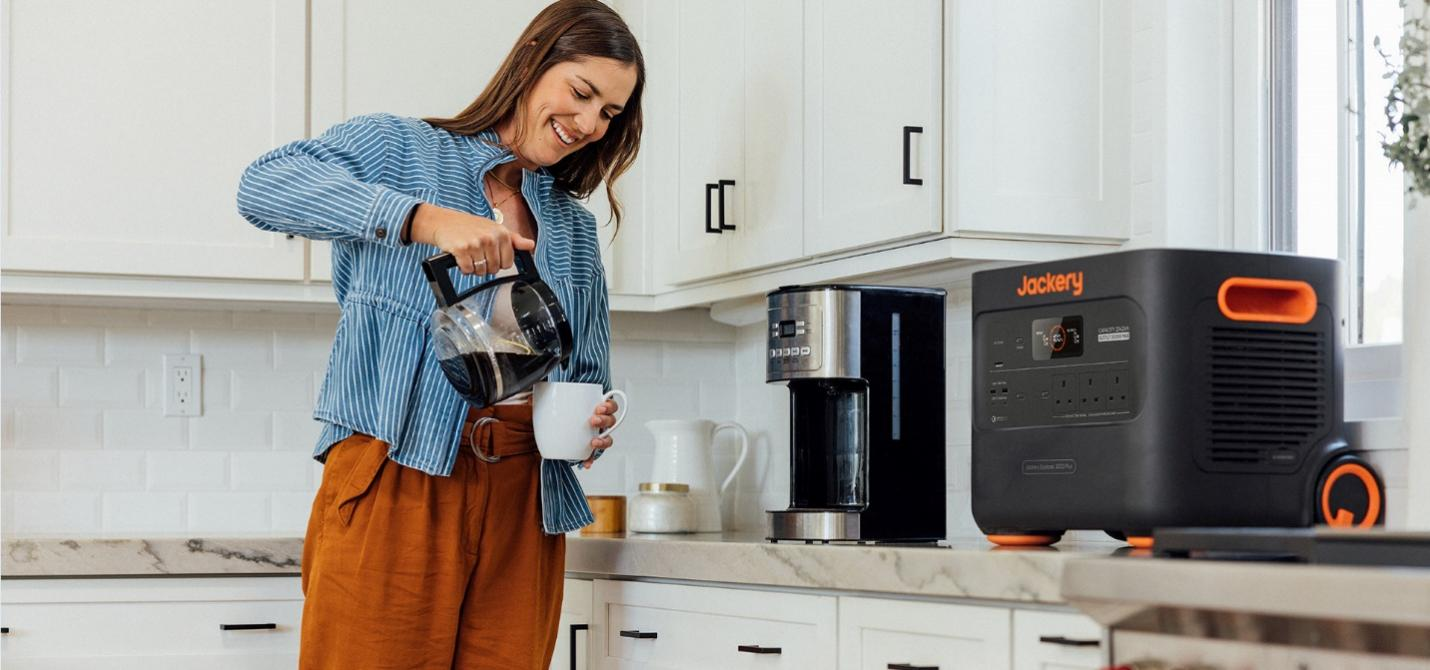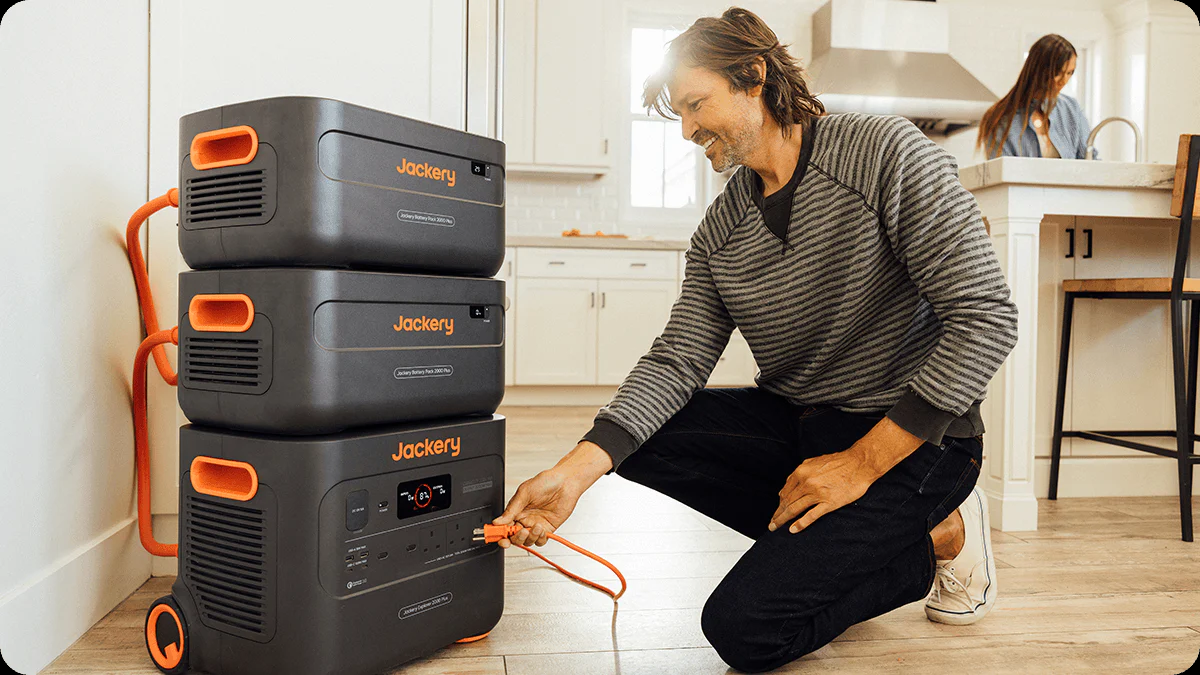Energy is an essential component of our everyday lives since it powers everything from houses to businesses. To save money and be more efficient, you need to know how to monitor and adjust your energy usage. Kilowatt-hours (kWh) and joules (J) are two crucial units used in energy calculations. One of the most popular conversions is between these two units. This article provides a comprehensive guide on converting kWh to joules.
It explains the difference between energy and power, providing real-life examples and conversion tables. This article can help you whether you want to minimise your power bill, work in energy management, or want to know how much energy you consume.
|
Key Takeaways: |
|
What Are Watts, Kilowatt Hours and Joules?
Let's use another example to explain the difference between power and energy. It takes about one joule (a unit of energy) to raise a can of cola to your mouth. Whether this operation takes a few seconds or an hour, the quantity of energy needed is the same. In contrast, power defines how much energy is used and how rapidly.
If you raise the can in one second, you use about one watt of electricity. However, if it takes 60 seconds to raise the can, you'll be exerting a 60th of a watt every minute. Now that we've covered the fundamentals of energy and power, let's look at what the individual units represent.
What Is a Watt?
A watt is a unit of power defined as a one-ampere current driven by a one-volt voltage. So, what does this mean? Essentially, multiplying the number of volts by the number of amps yields the total number of watts required to power an item.
For example, a washing machine draws roughly 10 amps from a supply of 230 volts (the norm in the UK), implying that the machine consumes around 2,200W.
What Exactly Is a Kilowatt and a Kilowatt-Hour?
A kilowatt is equivalent to one thousand watts, another unit of power. The term 'kilo' refers to one thousand.
However, kilowatt-hours are a different measurement. If you utilise 1 kW for an hour, you will have 1 kWh. Our simple explanation explains the difference between kilowatts and kilowatt-hours.
What Is a Joule?
Joules have previously been covered in this book; remember how we stated it takes around one joule of energy for a person to raise a can of soda? A joule is the amount of energy expended when exerting a force of one newton to move an object one metre.
How Many Watts Are in a Kilowatt Hour?
Calculating how many watts or kilowatts are in a kilowatt hour will help you better understand your energy use. A kWh is just 1,000W utilised for 60 minutes. For example, a 100-watt light bulb left on for 10 hours would use 1 kWh.The amount of watts in a kWh is determined by how long the appliance or gadget is turned on; therefore, you may need to do some calculations.
First, determine the wattage of the gadget. For example, the box of a lightbulb will indicate its wattage, such as 60W. This implies it consumes 60 watts for every hour it is on. To convert the amount of watts to kilowatts, divide it by 1,000.
In our case, 60 divided by 1000 is 0.06kW. Next, double this figure by the number of hours the gadget will be utilised, say eight. 0.06 kW multiplied by eight is 0.48 kWh.
How Many Joules of Energy Are in a Kilowatt-Hour?
One kWh contains about 3.6 megajoules, and one megajoule equals one million joules. This implies that one kilowatt-hour contains about 3.6 million joules.
How Many kWh are in 1 Joule?
The solution is 2.777777777778E-7. We presume you're converting between kilowatt hours and joules. You may get additional information about each measuring unit: kWh or Joules. The joule is a SI-derived unit of energy. One kWh is equivalent to 3600000 joules. Keep in mind that rounding mistakes might occur, so always double-check your findings.

How To Convert kWh To Joules?
One kilowatt-hour is equivalent to 3600000 joules.
1 kWh = 3600000J = 3.6 x 106J = 3.6 MJ.
So the energy in joules, E(J), is equivalent to 3600000 times the energy in kilowatt-hours, E(kWh).
E(J) = 3600000 × E(kWh)
kWh To Joules Conversion Table
|
Energy (kWh) |
Energy (J) |
|
1 kWh |
3600000 J |
|
2 kWh |
7200000 J |
|
3 kWh |
10800000 J |
|
4 kWh |
14400000 J |
|
5 kWh |
18000000 J |
|
6 kWh |
21600000 J |
|
7 kWh |
25200000 J |
|
8 kWh |
28800000 J |
|
9 kWh |
32400000 J |
|
10 kWh |
36000000 J |
|
20 kWh |
72000000 J |
|
30 kWh |
108000000 J |
|
40 kWh |
144000000 J |
|
50 kWh |
180000000 J |
|
60 kWh |
216000000 J |
|
70 kWh |
252000000 J |
|
80 kWh |
288000000 J |
|
90 kWh |
324000000 J |
|
100 kWh |
360000000 J |
|
200 kWh |
720000000 J |
|
300 kWh |
1080000000 J |
|
400 kWh |
1440000000 J |
|
500 kWh |
1800000000 J |
|
600 kWh |
2160000000 J |
|
700 kWh |
2520000000 J |
|
800 kWh |
2880000000 J |
|
900 kWh |
3240000000 J |
|
1000 kWh |
3600000000 J |
(Data Source: Rapid Tables)
Why Do We Use kWh Instead of Joules?
A joule is the SI basic unit of energy. In physical terms, raising an apple one metre requires one joule of energy. This is not to be confused with watts, which are a unit of power and a measure of how quickly energy is consumed.
While the joule is the SI base unit for energy, in everyday parlance, we often use the kilowatt-hour (kWh). This is because a joule is an exceedingly tiny unit of energy. To put a joule in perspective, one litre of gasoline has 31,536,000 joules of energy. Using a single 100 W incandescent light bulb for ten hours (0.1 kW x ten hours = one kWh) would need 3,600,000 joules. Human actions use several joules of energy!
Energy Terminologies
'Energy' is measured in Joules (J), whereas the rate at which energy is created or consumed is measured in Watts. One watt equals one Joule per second (Js-1). The kilowatt, often known as 1000 Watts or 1kW, is the most frequent measure of Wattage when discussing energy usage.

What Is Energy?
Energy, or the capacity to accomplish work, is measured as a force multiplied by a distance. Its unit is the joule, which is comparable to a force of one newton acting on an object over a distance of one metre.
This is best shown by elevating an item 1 metre. The force acting is gravity (or the object's weight), and if the distance is 1 m, the energy acquired is the object's weight measured in Newton Metres, which is equivalent to a Joule.
Most applications must comprehend the power, not the energy, necessary to complete the task. You may be able to push your automobile to work, but the engine will allow you to get to work much faster and without exhaustion. Power is defined as the amount of energy provided every second, expressed in joules per second, or watts. A thousand Watts is known as a Kilowatt (kW). Kilo is derived from a Greek term meaning thousand; it is used as a prefix in many everyday settings, such as kilobytes (1000 bytes) in computers, kilohertz (1000 Hertz) for frequency, and kilometre (1000 metres) or distance.
Energy Rating
Kilowatts are the units of measurement used to grade electrical equipment. An oil-filled radiant heater, for example, has a power rating of 1.5kW. This implies that when you turn on the heater, it will instantly use up to 1.5 kW. When vast quantities of energy are produced or used, the units used are more likely to be Megawatt (1,000,000 Watts or 1MW), Gigawatt (1,000,000,000 Watts or 1GW), or Terawatt (1,000,000,000,000 Watts or 1TW).
Energy Consumption
Energy consumption units are often stated in terms of the quantity of energy used over a specific period; the standard word for this is kilowatt hours (kWh), which is the amount of energy used in one hour.
If the 1.5kW heater is kept on for an hour with a continuous power source, it will burn 1.5kWh of energy. Electricity is sold by the kWh, which is equivalent to one unit of electricity. The current average household tariff is 14p per kWh, so leaving the electric heater on for an hour will use 1.5 units of energy and cost 21p.
Energy Generation
Generators are rated in kW or MW, which indicates the maximum power that can be produced at any one time. If a 1kW generator runs at maximum capacity for an hour, it will produce 1kWh of electricity.
However, the quantity of energy produced will be determined by the amount of usable energy available to run the generator. It will only reach its full rated output if it is supplied with enough usable energy. This is true for both a tiny diesel generator and a solar generator; the main difference is that a small diesel generator is typically either on (with fuel) or off (without fuel), but the output of a wind generator varies with wind speed.
Energy Measurement in Different Contexts
Energy, in its different forms, is a fundamental idea that influences our everyday lives. Understanding how energy is measured, from electricity to heat and mechanical energy, is critical for monitoring consumption and increasing efficiency.
In this section, we will look at various energy measuring units, including joules, watts, British thermal units (BTUs), kilowatt-hours (kWh), and others. By examining these measures, we can gain a deeper understanding of how energy is measured and utilised in various applications.

Comprehending Energy Measurement
Energy is measured in a variety of units and methods to reflect its quantity, flow, and power. Let's look at a few critical units and their significance:
Joule (J): The joule (J) is a unit of energy measurement that is used to determine how much energy is transported, consumed, or generated. A joule is the energy necessary to exert one newton of force across a one-meter distance. This unit is commonly used to measure various types of energy, including electrical, mechanical, and thermal energy.
Watt (w): The watt is a power measuring unit that represents the rate at which energy is generated, consumed, and transported. A watt is equivalent to one joule every second. Power quantifies the rate at which energy is utilised or changed, and it is critical in evaluating the capacity and efficiency of electrical equipment.
British Thermal Unit (BTU): The British Thermal Unit (BTU) is a widely used measurement of energy content, particularly in heating and cooling applications. One BTU roughly corresponds to the amount of energy necessary to raise the temperature of one pound of water by one degree Fahrenheit. It is commonly used to determine the energy content of fuels like natural gas.
Kilowatt hours (kWh): The kilowatt-hour is a unit of measurement used to calculate energy use over time, especially in electricity bills. It shows the amount of energy used when a gadget with a power rating of one kilowatt runs for one hour. One kilowatt-hour is equivalent to 3.6 million joules.
Calorie: A calorie is a common way to measure energy in nutrition and food studies. It tells you how much heat it takes to raise the temperature of one gram of water by one degree Celsius. People commonly utilise the calorie to figure out how much energy food has.
Measurement in Various Contexts
Electrical Energy: Electricity usage is often measured in kilowatt-hours (kWh). This unit represents the total quantity of electric energy utilised during a specific time. It is used in utility billing to help customers understand their power consumption.
Thermal Energy: BTUs are often used to measure the quantity of heat generated or transported. This is especially important in heating, ventilation, and air conditioning (HVAC) systems, as well as in measuring natural gas energy content.
Mechanical Energy: Mechanical energy, such as that generated by engines or motors, is usually measured in kilowatts (kW) or horsepower (HP). These units represent the device's power output and offer information on its performance.
Kilowatt-Hours (kWh) Conversion Table For All Energy Units
Convert from kilowatt-hours (kWh)
|
1 kWh = 3600000 J |
Joules |
|
1 kWh = 3600 kJ |
Kilojoules |
|
1 kWh = 860.4206500956 kcal |
Kilocalories |
|
1 kWh = 1 kWh |
Kilowatt-hours |
Convert to kilowatt-hours (kWh)
|
Joules |
1 J = 2.7777777777778E-07 kWh |
|
Kilojoules |
1 kJ = 0.00027777777777778 kWh |
|
Kilocalories |
1 kcal = 0.0011622222222222 kWh |
|
Kilowatt-hours |
1 kWh = 1 kWh |
(Data Source: All the Units)
Conversion Between Energy Units
Various conversion factors are employed when converting one unit to another. Here are a few popular conversions.
1 BTU is about 1,055 joules.
1 kilowatt-hour equals 3.6 million joules.
One calorie is about 4.184 joules.
1 BTU is about 252 calories.
Calculating Energy Costs
Determining how much energy you use may seem challenging, but it's a crucial step in lowering your bills and saving money. To begin, you need to know two things: how many kilowatt hours (kWh) of energy you use and how much it costs per kWh. It's easy to figure out how much energy costs:
Energy Cost = Energy Usage (kWh) times the cost of electricity per kWh
For example, if your energy consumption is 100 kWh and the electricity cost per kWh is 15p, your energy cost will be:
Energy cost = 100 kWh x 15p/kWh = £15.
You can figure out how much energy you're using and how it affects your electric bill with this simple math. You may also find several online energy calculators that can do the maths for you. These applications look at how much energy you use, how much it costs, and other factors to give you an accurate estimate of your energy expenses. You can make smart decisions about how to cut back on your energy use and save money by regularly keeping track of how much you spend on energy.

Energy Efficiency and Appliances
Energy efficiency is essential for lowering energy expenses and decreasing your carbon footprint. Choosing energy-efficient equipment may reduce your energy costs. Here are some recommendations for selecting the most energy-efficient appliances.
Look for High Energy Efficiency Ratings: Appliances with ratings such as A++ or A+++ are intended to consume less energy.
Consider Low Power Ratings: Devices like LED lighting and energy-efficient refrigerators use less electricity.
Consider Smart Technology: Smart thermostats and smart plugs may help you better monitor and regulate your energy consumption.
Some of the most energy-efficient appliances are:
LED Bulbs: LED bulbs consume up to 90% less energy than standard incandescent lamps.
Energy-Efficient Refrigerators: These use up to 50% less energy than earlier versions.
Smart Thermostats: Smart thermostats may help you save up to 30% on your heating and cooling expenses by optimising your energy use.
Investing in energy-efficient appliances not only lowers your energy expenses but also helps to create a more sustainable world.
Popular Appliances And What They Cost To Operate
|
Appliance type |
Daily active cost |
Daily standby cost |
Annual standby cost |
|
Desktop computer |
£3.06 |
£0.04 |
£13.39 |
|
Dishwasher |
£8.66 |
£0.02 |
£7.44 |
|
Fridge |
£0.16 |
£0.16 |
£56.89 |
|
Kettle |
£20.38 |
£0.0001 |
£0.74 |
|
LCD TV (120 W) |
£1.22 |
£0.02 |
£5.70 |
|
Microwave |
£10.19 |
£0.02 |
£5.95 |
|
Phone charger |
£0.03 |
£0 |
£0.64 |
|
Tumble dryer |
£30.56 |
£0.02 |
£6.45 |
|
Washing machine |
£14.26 |
£0.02 |
£6.45 |
(Data Source: Eonnext)
Jackery Portable Power Stations Explained
When discussing Jackery Portable Power Stations, the term kWh (kilowatt-hour) is the most crucial unit for understanding their capacity and how they can save you money on electric bills.
The Jackery Portable Power Stations have their battery capacity measured in watt-hours (Wh). For larger models, this is often converted to kilowatt-hours (kWh) to make the number more manageable and comparable to household energy consumption.
The kWh capacity of a Jackery Portable Power Station directly tells you how much energy you can store and use. This is the key to calculating your potential savings and how long the generator can power your devices.
Jackery Explorer 1000 Plus
The Jackery Explorer 1000 Plus's capabilities are best appreciated through its kilowatt-hour (kWh) capacity, which is a valuable indicator for assessing its potential for backup power, off-grid living, and cost savings.

Base Capacity: The Jackery Explorer 1000 Plus comes with a base battery capacity of 1264 Wh, which translates to approximately 1.26 kWh. This is a significant amount of energy that can handle a wide range of devices. To put this into perspective, it means the unit can power a 1,000-watt device for just over 1.25 hours, or a 100-watt device for more than 12 hours.
Expandable Capacity: Scalability up to 5 kWh. One of the most notable features of the Jackery Explorer 1000 Plus is its expandability. The base unit can be connected to up to three additional battery packs, each with a capacity of 1264 Wh. This allows you to increase the total capacity to a substantial 5 kWh (5,056 Wh).
Extended Home Backup: A 5 kWh system can provide enough power to run critical home appliances for several days, such as a refrigerator, freezer, and lighting. This level of capacity can provide peace of mind during extended blackouts.
Long-Term Off-Grid Power: For RVers or people living off-grid, a 5 kWh system can serve as a primary power source for a long weekend or even a week, depending on the energy demands.
Cost-Effective Scalability: You can start with the base unit and invest in additional battery packs as your needs grow, making it a more manageable financial commitment than purchasing a much larger, non-expandable power station from the start.
Jackery Explorer 2000 Plus
The best way to understand the Jackery Explorer 2000 Plus's energy identity is through its kilowatt-hour (kWh) capacity. This statistic goes beyond just wattage to give a whole picture of how much power the unit can store and distribute over time. This is very important for home backup, living off the grid, and big projects.

Base Capacity: The Jackery Explorer 2000 Plus can hold up to 2042.8 Wh, or about 2 kWh. This means that the unit can provide 1,000 watts of electricity for around two hours right out of the box, or 100 watts for about 20 hours. This energy can meet various demands, such as powering a portable air conditioner for a few hours or keeping a refrigerator and a few lights on for a whole day when the power goes out.
Massive Expandability: What truly sets the 2000 Plus apart is its modularity. Its capacity isn't fixed at 2 kWh. You can add up to five additional battery packs, each with a capacity of 2 kWh, to the central unit. This increases the total capacity to 12 kWh.
Whole-Home Backup: A 12 kWh system can power a typical household for several days, keeping essential appliances like a refrigerator, freezer, lights, and even a well pump or sump pump operational during an extended blackout.
Long-Term Off-Grid Living: For RVers, campers, or anyone living off the grid, this expandable capacity means they can have a reliable power source for an extended period without needing to recharge, making it a viable alternative to a noisy and fuel-dependent gas generator.
Long-Lasting and Safe LiFePO4 Battery: The Explorer 2000 Plus utilises a Lithium Iron Phosphate (LiFePO4) battery, which offers significant advantages over other lithium-ion chemistries. LiFePO4 batteries are rated for a significantly higher number of charge cycles (up to 4,000 cycles to 70%+ capacity). This means the power station is built to last for over a decade with regular use, providing reliable power for the long term.
FAQs
The following are frequently asked questions about the kWh to joules.
1. What is 1 kWh equal to in joules?
3.6 million joules
So, 1 kilowatt-hour (kWh) has 3.6 million joules: 3.6×106 J is equal to 1 kWh.
2. How do you convert kW to J?
One kilowatt is equal to 1,000 watts, and it is the most common unit of electrical power. Energy throughout time is what we mean when we say "power." One watt is equal to one joule per second (1W = 1 J/s); hence, one kilowatt is equal to 1000 joules per second (1 kW = 1000 J/s).
3. Is 1 kWh equal to 106 joules?
The rationale given is that 1 kWh is equivalent to 10^6 joules (J). This is also true since 1 kWh is the same as using 1000 watts for 1 hour, which can be converted into joules like this: 1 kWh = 1000 W * 3600 s = 3.6 x 10^6 J.
4. Are kWh just joules?
The joule (J) is the SI unit of energy. On the other hand, one kilowatt-hour (kWh) is equal to 3,600 kilojoules (kJ) or 3.6 megajoules (MJ) since a watt is one joule per second and there are 3,600 seconds in an hour.
5. What is 5 kWh equal to?
5 kWh has 1.8 x 10⁷ joules.
Final Thoughts
People need to know more about energy in both their personal and professional lives. People and organisations can better control their prices and usage by understanding how to convert kilowatt-hours (kWh) to joules. One kilowatt-hour (kWh) is equivalent to 3.6 million joules; therefore, even little gadgets may require a lot of energy over time. Anyone can contribute to sustainability by understanding how to convert these numbers, utilising energy-efficient equipment, and monitoring their energy usage.
References
1. Energy Efficiency and Energy Content of Different Fuels - Geosciences LibreTexts
2. British Thermal Unit - Blue Fox Roofing & Renovations.
3. Energy Converter − Convert energy units.
4. WattShift - Smart Thermostat Energy Management.
5. J to MWh | Joules to Megawatt-hour Converter - ConvertOnline.org.


































































































